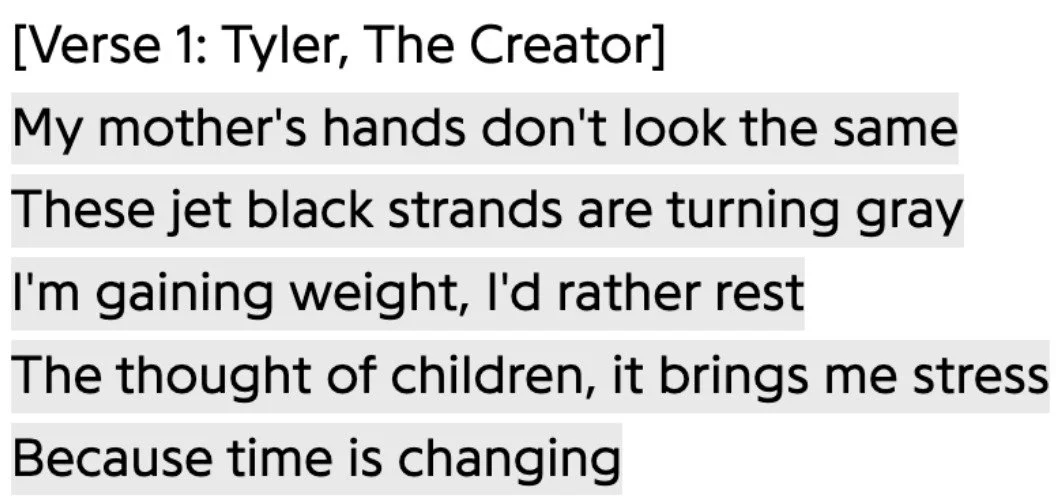REVIEW: Tyler, the Creator’s Chromakopia
By Andy Han ‘26
Courtesy of NamuWiki
“You are the light; it’s not on you, it’s in you.” – Bonita Smith, Tyler’s mom, “St. Chroma”
Tyler the Creator, an American rapper, record producer, director, and fashion designer, recently released his highly anticipated record, Chromakopia, on Oct. 28, 2024.
First teased in his “Sorry Not Sorry” music video for Call Me If You Get Lost: The Estate Sale, which debuted on Mar. 29, his speculated persona for this record, “St. Chroma,” appears briefly in the edge of the first shot. Donned in a distinctive green military uniform, the same worn by Tyler, the Creator, on the Chromakopia album cover.
So, what do Catlin Gabel Upper School students think about this new release from Tyler? Junior Nico Igarashi, an avid Tyler the Creator listener, shared his opinions regarding Chromakopia.
“I guess I was a little let down,” responded Igarashi as to his first reactions after listening to Chromakopia. Igarashi felt Tyler’s latest record wasn’t cohesive enough and that it had “no clear narrative” compared to the rest of his discography, with IGOR being the exemplar.
Igarashi’s least favorite tracks aligned with mine for similar reasons, including “Judge Judy” and “Thought I Was Dead,” with favorites including “Take Your Mask Off” and “Darling, I.” He felt the main drawback to these tracks was that they felt unrelated to the rest of the album.
However, some other die-hard fans claim this album ranks amongst Tyler’s strongest. Senior Charlie Broad, a seasoned Tyler connoisseur, passionately shared his opinions with me regarding Chromakopia.
Overall, Broad enjoyed the album, attributing to strong storytelling, varied production, and a distinctive “Signature Tyler” feel. To him, Chromakopia feels like an authentic Tyler record that offered a “look into his [Tyler’s] life.”
When asked about the main appeal of Tyler the Creator as an artist, Broad said, “Tyler’s appeal is who he is. He’s very personable; he’s got a character; he seems like a genuine guy.” Tyler’s individuality shines through, especially on tracks such as “I Hope You Find Your Way Home” and “Take Your Mask Off,” two tracks of which were unanimously favored by both Igarashi and Broad.
Some Tyler fans might find the album disappointing due to the lack of cohesiveness, which is an understandable criticism given Tyler’s past works.
Tyler’s discography follows a specific formula, consistently releasing a new album (except deluxe versions) every two years. From his freshman work, Goblin, released in 2011, to Call Me If You Get Lost, released in 2021, his works have been consistent in that they follow a specific theme or structure.
For example, according to Michael Heal of Genius, Tyler’s 2017 Flower Boy uses the motif of a car as an allegory to explore themes of self-exploration and his journey through life. There’s a consistent storyline within Flower Boy that reveals aspects of Tyler’s identity as the tracklist takes us through a metaphorical car ride.
IGOR follows a circular storyline with Tyler taking on the persona of Igor–referencing Mary Shelley’s Frankenstein novel–as the titular character of the record. It details the events of his (Igor’s) complicated love life, navigating a love triangle throughout the album’s 12 songs and 40-minute runtime. IGOR’s structure aligns with a traditional narrative arc with exposition, rising action, climax, and resolution.
Similarly, after the commercial and artistic success of IGOR and Flower Boy, Tyler the Creator decided to continue his tradition of structured albums, resulting in the lush, victory-lap record that is his 2021, Call Me If You Get Lost.
Every Tyler the Creator album is defined by a distinct sound, a distinct look, and a distinct personality. Flower Boy, Igor, and Tyler Baudelaire are personas that represent Tyler’s respective eras and personalities throughout his discography.
However, on Chromakopia, Tyler takes a new approach to album structure.
In the first three tracks, from “St. Chroma” to “Noid,” we’re led to believe that the whole album will be military-themed through sonic motifs such as marching footsteps, chanting, and trumpets. In addition, shrill synths and distorted guitar power chords also contribute to the militaristic and gritty texture of the album’s first quarter. The green Nigerian military-style uniform donned on the cover also suggests that this will be Tyler's persona in this album.
Nigerian Armed Forces uniform Courtesy of Nigerian Defense Academy,
Tyler’s Chromakopia outfit Courtesy of Cosmopolitan
However, as the album progresses, any traces of a singular, defined “persona” quickly diminish. Instruments such as the trumpet and piano take the main stage, with the track, “Darling, I,” acting as a left turn in the album to introduce the progression of the themes.
From this point on, Tyler’s lyrics, flow, and production sound all too familiar to his previous work on IGOR and Call Me If You Get Lost. For example, “Darling, I” not only matches the lyrics and tone of “GONE, GONE/THANK YOU,” a hit track from IGOR, but they also have eerily similar percussion patterns as well.
While the first four songs on Chromakopia introduced some interesting ideas and lyrics from Tyler, the following four-song stretch from “Hey Jane” to “Sticky” would prove to be the album’s weakest section.
To start, the production and rapping on “Hey Jane” is painfully drab. Tyler’s rapping on this track is emotionally hard-hitting, but the mellow production doesn’t complement his voice well enough to bring it out as a highlight on the track. Without any noticeable progressions in structure and melody, nor peaks and valleys, this track becomes a tempting skip.
On “I Killed You,” the production interpolates “Wheels on the Bus,” a famous nursery rhyme, alone making this track an interesting listen. In addition, this track is juxtaposed with Tyler’s discussion about rather serious themes of societal norms and racial identity, which, when paired with growingly tense synths and a lack of cathartic release, makes this track very unrewarding to listen to.
Going further with the theme of juxtaposition, “Judge Judy” perhaps offers the most uncomfortable listen in the whole of Chromakopia.
The relaxed, cheerful, Call Me If You Get Lost–reminiscent production is contrasted sharply by discussion of topics surrounding polyamory, death, and sexual freedom. These out-of-place, unrelated, and obscene lyrics do not contribute to the thematic cohesiveness of the album. To add to this track, while Frank Ocean is an appreciated hidden feature, I don’t believe that his moans add anything of value lyrically.
Thankfully, the next track, “Sticky,” is packed with a catchy melody and witty lyrics from featured artists GloRilla, Sexyy Red, and Lil Wayne. Elements found in earlier tracks, such as whistles, bells, brass instruments, shrill synths, and harmonized choruses, all come together in “Sticky” to reenergize the listener for the latter half of the record.
From here, Chromakopia regains its momentum.
In “Take Your Mask Off,” Tyler blends his vocal storytelling with atmospheric synths in a stunning display of artistry. At first, the track is abundant with instruments, sounds, and vocals, but as the track progresses, these things are stripped away gradually, putting the emphasis on Tyler’s voice and building up for a cathartic release at the end of the track. Promoting one of the central themes of Chromakopia—individual identity—“Take Your Mask Off” is a masterclass in sonic storytelling.
Following a similar tone of self-reflection, “Tomorrow” is one of Tyler’s more existential tracks, where he reflects on his fears, his age, and his family. The lone guitar haunts the track with its melancholic chord progression, while Tyler’s vocals offer hope.
Verse 1 lyrics for “Tomorrow” Courtesy of Genius
Moving on to the concluding stretch: “Thought I Was Dead,” “Like Him,” and “Balloon” all explore vastly different themes, and while they are all fantastic standalone songs, their placement in the tracklist doesn’t make sense thematically or musically.
For one, “Thought I Was Dead” mirrors the opening track, “St. Chroma,” in that they share militaristic elements such as chanting and marching, while “Like Him” is more emotional and would be more appropriately placed next to “Take Your Mask Off” or “Tomorrow.” Likewise, the cheery production on “Balloon” would fit more snugly next to a similarly peppy track such as “Darling, I.”
The album’s closer, “I Hope You Find Your Way Home,” is without a doubt my standout favorite track from Chromakopia. It brings all the ambitious themes, musical elements, and motifs into what I believe to be Tyler’s best closing track ever.
High-pitched synths and Tyler’s chanting of “The light comes from within,” quoting his mother from the opening track, transitions seamlessly into the album’s conclusion. This mirrors the cyclical structure seen in IGOR, where the final track, “Are We Still Friends?” ties back musically to the intro, “Igor’s Theme,” as does “I Hope You Find Your Way Home” ties back to “St. Chroma” within Chromakopia.
The title of the final track, “I Hope You Find Your Way Home,” encapsulates the theme of the album as a whole as a musical homecoming. Tyler isn’t trying to create a persona or story; he’s simply returning to his past eras of musical endeavors, expanding on them to reflect on his life and career as an authentic whole.
Ultimately, Chromakopia is a celebration of Tyler as an individual. Never before has Tyler expressed this level of vulnerability, metaphorically shedding himself of the various personas throughout his career to reveal his true, authentic self. However, the reality is that self-exploration in any medium of art can get messy.
The most obvious drawback to Chromakopia isn’t Tyler’s lyrical or production abilities, but rather its lack of a structured storyline unlike that of his past works. As a given for any album without a concrete structure, Chromakopia can feel disorganized and unpolished at times.
Personally, I feel the lack of any one specific persona or storyline does not take away from the album’s significance or enjoyment. On the contrary, I thought it added to the realism of the album and helped it feel more like a personal work of art, rather than just another piece of generic commercial music.
While Chromakpia may not bring a completely new sound or character to the table as some fans expected, Tyler the Creator’s latest work is him at his most mature. Chromakopia is, by far, the most complete sonic representation of his artistic and personal identity we’ve gotten to date.
Based on criteria including: production, lyricism, and overall structure, Chromakopia earns itself a well-deserved score of…
Verdict: 7.8/10




